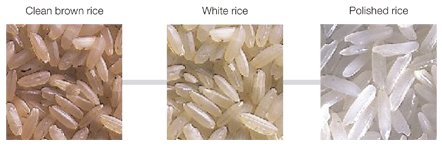 At the supermarket yesterday I noticed a packet of brown rice, I wondered if there was any truth to how much healthier it claimed to be, so I decided to do some research, this is what I discovered.
At the supermarket yesterday I noticed a packet of brown rice, I wondered if there was any truth to how much healthier it claimed to be, so I decided to do some research, this is what I discovered.
Brown rice, also known as "hulled rice", is not milled or only partly milled rice. It is chewier than white rice and has a slightly nutty flavor. It has more nutritional value than white rice but by comparison decomposes more quickly.
White rice is rice which has been milled, having it's husk, bran and germ removed. This is done to extend the life of the grain, so that it can be shipped further and stored for longer.
The Milling process
The main difference between brown rice and white rice is the milling process, which affects the nutritional content. Milling is often referred to as "whitening" because the variety of rice may be identical, but milling removes the husk and the bran from the grain turning it from brown to white. After milling, white rice is polished, to give it a bright, white, shiny appearance.

- During the milling and polishing process many vitamins and dietary minerals are lost. In "enriched" white rice some of these nutrients are added back in a chemical form, such as vitamins B1, B3, and iron, but the majority are lost.
- In removing the bran layer the oil is also removed, a recent study has shown that rice bran oil may help lower LDL cholesterol.
- Fiber and fatty acids are also lost in the process, one cup of brown rice has over three grams of fiber, while the equivalent white rice has less than one gram.
- Brown rice is reputedly easier to digest, because it contains more bran than it's white rice counterpart.
Table of Nutritional differences between Brown and White rice:
| Brown Rice (one cup) | White Rice (one cup) | |
| Calories | 232 | 223 |
| Protein | 4.88 g | 4.10 g |
| Carbohydrate | 49.7 g | 49.6 g |
| Fat | 1.17 g | 0.205 g |
| Dietary Fiber | 3.32 g | 0.74 g |
| Thiamin (B1) | 0.176 g | 0.223 g |
| Riboflavin (B2) | 0.039 mg | 0.021 mg |
| Niacin (B3) | 2.730 mg | 2.050 mg |
| Vitamin B6 | 0.294 mg | 0.103 mg |
| Folacin | 10 mcg | 4.1 mcg |
| Vitamin E | 1.4 mg | 0.462 mg |
| Magnesium | 72.2 mg | 22.6 mg |
| Phosphorus | 142 mg | 57.4 mg |
| Potassium | 137 mg | 57.4 mg |
| Selenium | 26 mg | 19 mg |
| Zinc | 1.05 mg | 0.841 mg |
Cooking Brown Rice
Brown rice takes longer than white rice to cook, so you need to increase the amount of water slightly.
- To prepare brown rice, use 2 cups of water for each cup of brown rice, and salt to taste.
- Bring salted water to a boil, and stir in rice.
- Reduce heat to a minimal simmer, and cook tightly covered for 30-45 minutes or until all water has been absorbed into rice.
Adding a couple tablespoons of yogurt helps to give brown rice the texture of white rice.
Reference:
http://en.wikipedia.org/wiki/Brown_rice
http://en.wikipedia.org/wiki/White_rice
http://www.drlam.com/opinion/brown_rice_vs_white_rice.cfm
http://nutrition.about.com/od/healthyshopping/f/brown_white_ric.htm



2 comments:
I really like cooking with rice bran oil. I have found that its high smoke point is great for all cooking needs plus it is so good for you.
Excellent, I'll have to try cooking with it, Thanks for the information.
Post a Comment